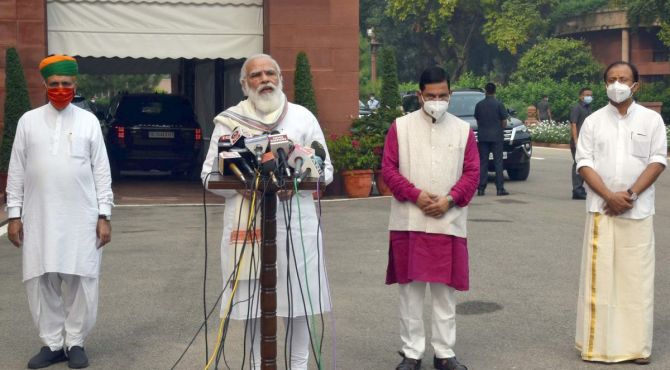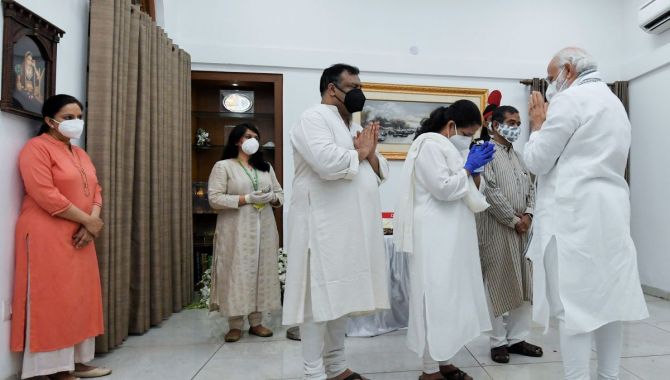 | « Back to article | Print this article |
We love a leader who oozes authority and firmness, notes Virendra Kapoor.

What is behind Narendra Modi's growing popularity? The question haunts the Opposition and its current allies in civil society.
Liberal-leftist pundits and independent observers alike are flummoxed by the prime minister's record approval ratings amidst an unprecedented economic and social crisis and a potentially dangerous confrontation with the Chinese on the Ladakh border.
What is most puzzling is that even after six years in power, anti-incumbency has not set in.
In fact, Modi is more popular now than at any time before.
A recent opinion poll put his approval ratings at a record 80 percent.
Remember, Indira Gandhi, with whom Modi is often compared as a populist politician, had begun to lose her sheen soon after the 1971 Lok Sabha election.
By 1974, she felt cornered, first by the Navnirman agitation against corruption in Gujarat and, later, backbreaking inflation.
A year later, she had to impose a state of Emergency to stay in power after her election was held null and void by the Allahabad high court.
As for Atal Bihari Vajpayee, well, he never attained the popularity that either Modi now, or Indira Gandhi early after the Bangladesh war did.
Vajpayee was the darling of the urban/semi-urban middle classes, but his grip on the great unwashed masses remained weak.
Modi, on the other hand, has a stronger hold on the OBCs/MBCs and SCs/STs than he has on the urban middle class.
The Jana Sangh/BJP were all along known to be an urban middle class phenomenon before Modi burst on the political scene.
Now you hear more anti-Modi noises in cities and towns than you do in the small villages and kasbas of rural India.
Yet, the negative factors against Modi outweigh those in the credit column.
Why, then, defying conventional logic, his ratings continue to soar high?

A quick look at the list of negatives which under normal circumstances ought to have led to disenchantment with Modi.
On top would have to be necessarily the state of the economy.
Even before the coronavirus knocked off a good quarter of GDP in the April-June period, the economy had entered the slow lane, recording dismal growth in over a decade in the previous three quarters.
According to the Centre for Monitoring Indian Economy, 21 million salaried jobs were lost during the pandemic-enforced lockdowns.
Partial reopening has restored but only a fraction of the jobs.
Again, the coronavirus continues tearing through society.
We are only behind the US in the number of infections and deaths, with nearly one lakh new cases being registered daily.
Unsurprisingly, the poor are the worst affected, with the virus now spreading to the rural areas as well.
The poor paid the most also when a nationwide lockdown was imposed at four hours's notice, causing a huge exodus from cities and towns to villages even as all modes of transport were shut down.
Scores lost their lives trekking on roads and rail tracks.
Some suffered from dehydration and hunger. Yet, it did not seem to have made a tangible dent in the PM's ratings.

Or take the ongoing confrontation with China.
We lost territory during the peak of the pandemic in early May when Indian troops, lulled by the fear of the virus, lowered their guard.
Since then, we have put China on notice, committed to defend our territorial integrity and to reclaim the land it illegally occupied in May.
Ordinary Indians cannot be unaware that our position in economic and military terms with China is more or less what Pakistan's is vis-a-vis India.
Yet, the China confrontation has not pushed Modi on the back foot.
People continue to repose faith in Modi, believing if anyone can defend India's honour and territorial integrity it is Modi and no-one else.
He is widely perceived to be a strong, determined, decisive leader.
We love a leader who oozes authority and firmness.
Anyway, Indians invariably rally to the flag in times of a national crisis.
The ruling dispensation has managed the public perception rather well, implying those asking pesky questions are not true patriots/nationalists.

However, it will be a mistake to mistake the popularity of Modi for that of his party.
Modi is far more popular than the BJP.
And that explains why the BJP doesn't do half as well in state elections as it does in the parliamentary poll.
Meanwhile, it is clear why there is near unanimity that in the coming Bihar assembly poll the JD-U-BJP alliance will retain power.
it is not because the Nitish Kumar government after three terms in power is popular with the voter.
No. it is because the election will be fought in Modi's name.
And Modi is very popular.
An unmatched orator who connects with the people he has no real challenger at present in the entire political horizon.
Feature Presentation: Aslam Hunani/Rediff.com